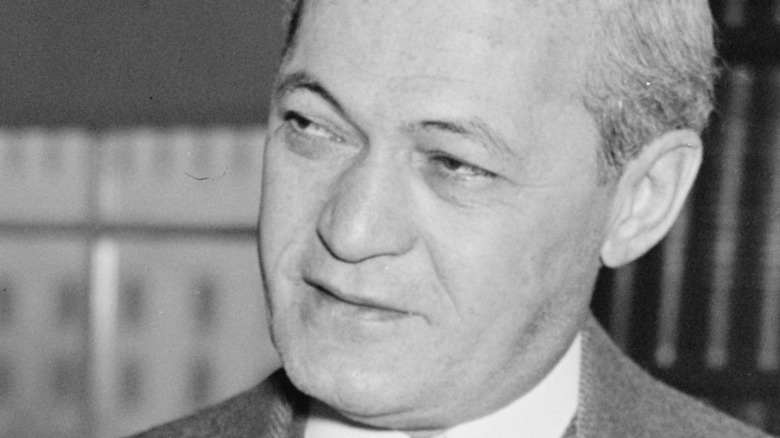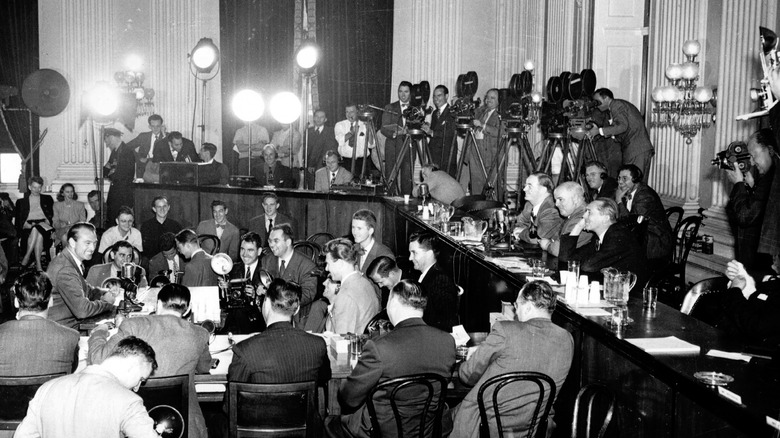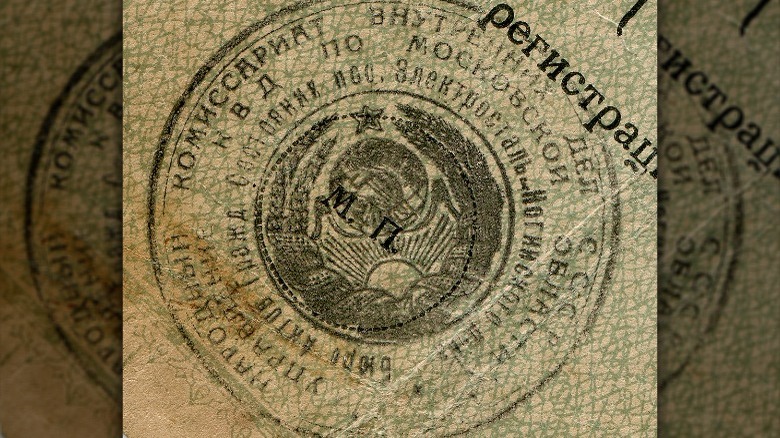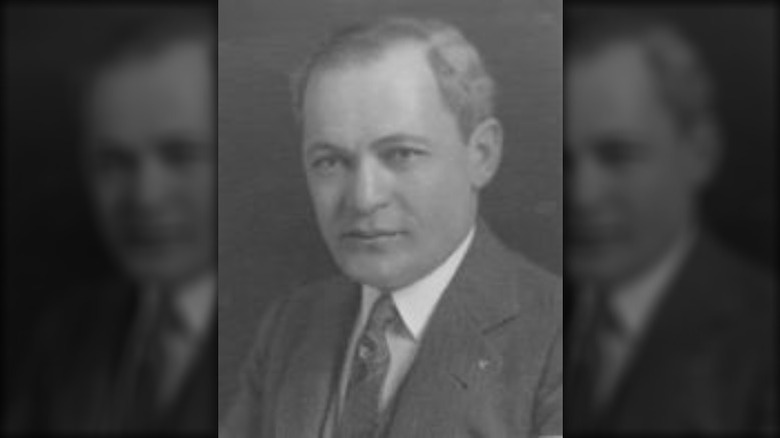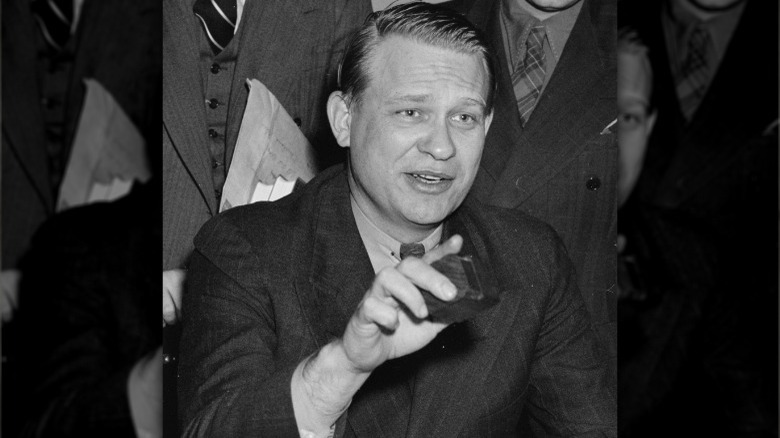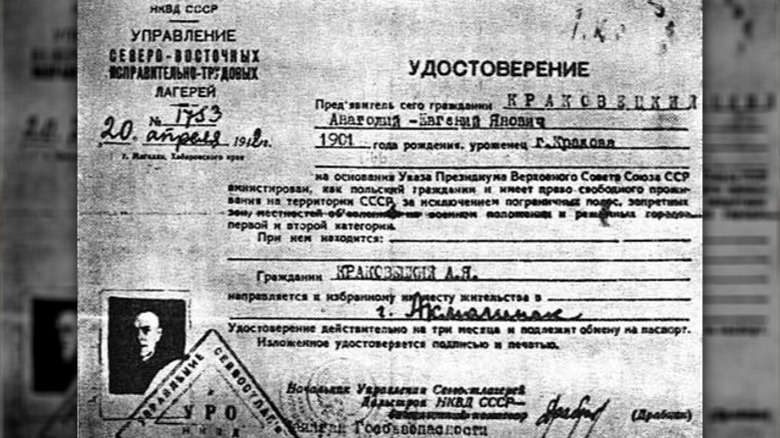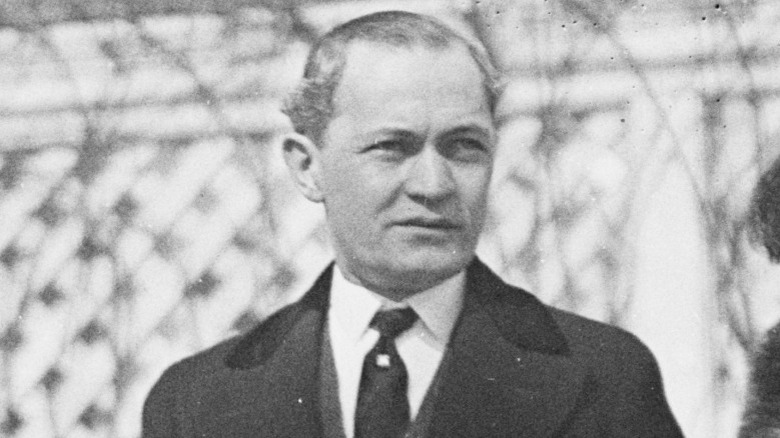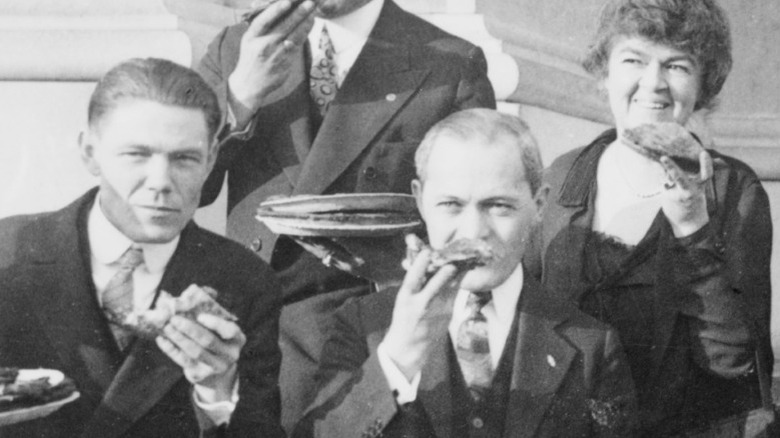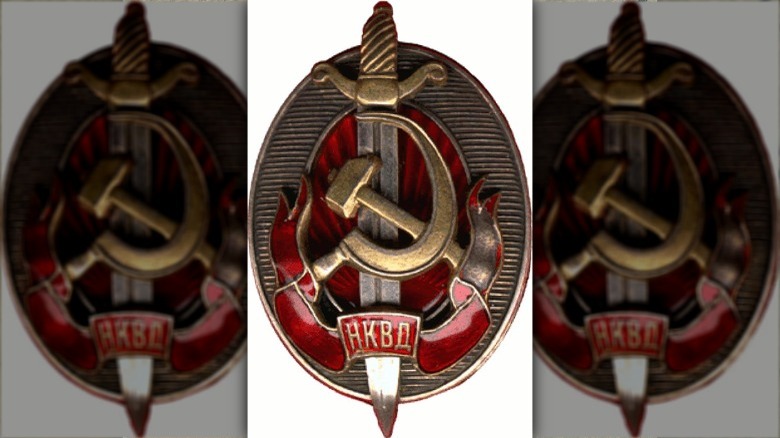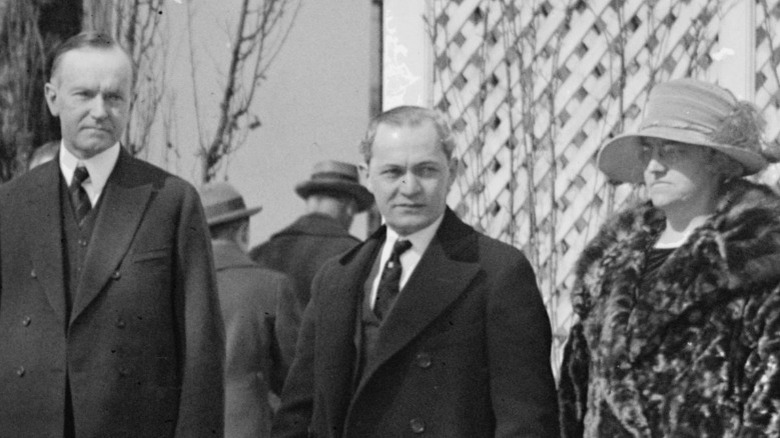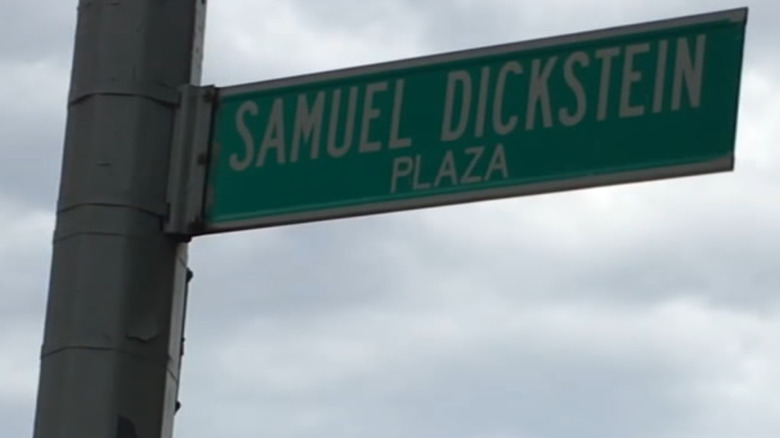The True Story Of The Congressman Who Was A Russian Spy
The Cold War is full of pretty bizarre stories, and there's no shortage of tales about spies, the state secrets shared by them, or even the wild and wacky gadgets they used to accomplish their illicit activities. And, of course, there are the big names when it comes to this particular niche in history: Aldrich Ames is kind of the go-to in terms of most notorious Soviet spies, feeding information across the globe for about a decade from his position in the CIA before being caught (via FBI). Or there are cases like Robert Hanssen, a mole who operated from within the FBI for about 15 years and is considered by the FBI itself to be one of the most dangerous Soviet spies who ever operated.
But the list doesn't stop there, and over the years, Soviet spies have come from places aside from just the CIA and the FBI. Rather, there's the case of the only U.S. Congressman who decided to sell his services to the Soviets, and who did so back in the 1930s and 1940s – long before either Ames or Hanssen came around. That story is little-known (or, at the very least, not really acknowledged all that much), but Samuel Dickstein's relationship with the Soviets was definitely an interesting one.
Samuel Dickstein's career in politics
Even though the term "spy" tends to conjure some spectacular images – maybe fantastical little gadgets, or maybe a suave James Bond-esque agent idly stirring a cocktail – the life of Samuel Dickstein doesn't really match up to that. (Then again, can anything really live up to that image?)
Per Politico, Dickstein was born in 1885 in Vilnius, Lithuania, but immigrated to New York while still young. Once there, he set upon the sort of path you'd expect of a future Congressman – attending law school, passing the bar, then rising through the ranks of the world of law. The United States House of Representatives outlines that career and how it led him to begin serving in a government office, first in his home state of New York, then as a Representative in Congress from 1923 to 1945.
He would eventually head the Immigration and Naturalization Committee (at least when he wasn't being famously aggressive and belligerent against his opponents) — something which might not have been that surprising. Allen Weinstein's "The Haunted Wood" does explain that immigration had always been an issue he championed, given that his supporters in New York were largely foreign-born. That said, as the 1930s rolled around, a different problem began to take precedence.
He founded the House Un-American Activities Committee
If you know something about the political climate of the mid-20th-century United States, then there's a chance the name House Un-American Activities Committee (or HUAC, for short) brings to mind the Congressional group with ties to the infamous case of the Hollywood Ten (via Britannica). Or maybe it generally makes you think of McCarthyism and the Red Scare (via the Harry S. Truman Library). And you'd be correct about those associations, but the story actually goes a bit deeper than that.
See, according to Politico, HUAC was originally called the "Special Committee on Un-American Activities Authorized to Investigate Nazi Propaganda and Certain Other Propaganda Activities," and it was actually started in March 1934 by Samuel Dickstein himself. Though he didn't lead the group, Dickstein was staunchly antifascist and intended for this incarnation of HUAC to uncover corruption related to Nazi activity in the U.S. And it did, proving that Nazi minister of propaganda Joseph Goebbel had actually paid off American PR firms to do, well, exactly what you'd expect: spread Nazi propaganda.
All the same, Dickstein didn't enjoy the best reputation as a result. After a couple of years, both congressmen and the public thought this was all a desperate ploy for Dickstein to keep his name relevant, and maybe they had reason to think so. Dickstein did barge into Congress one day, claiming that he could name 100 Nazi spies on the spot – a pretty dramatic thing to do.
Samuel Dickstein's first encounter with the NKVD
Samuel Dickstein's relationship with the Soviet intelligence agency – the NKVD – is, admittedly, a bit hazy at times; Politico even explains that Dickstein's name had been almost entirely lost to time until 1999. But when it comes to his first interaction with the NKVD, "The Haunted Wood" seems fairly certain about what happened there.
On July 8, 1937, Dickstein was contacted by an Austrian NKVD agent, known simply as "Buby," who was looking to get a hold of a U.S. visa (a little less than legally), and Dickstein was basically a no-brainer. After all, in terms of business that was above board, he'd always had connections to immigration issues, given his position in Congress, and on the shadier side, he was far from unfamiliar with getting people visas under the table. He agreed to do the job, pointing NKVD agents to a contact he had in Montreal. After a few disagreements over the payment that Dickstein was owed (the first of many disagreements, in fact), and despite the immigration quotas already being filled for that year, Dickstein did manage to acquire that visa for the Soviets, marking the beginning of a very rocky relationship.
Samuel Dickstein promised information on Russian fascists
Once Samuel Dickstein had established contact with Soviet intelligence agents, it didn't take long for him to also start putting his staunchly antifascist stance to use. Only a few months after his first contact with the NKVD, in December 1937 (via Politico), he decided to reach out to the Soviet ambassador in Washington – a man by the name of Alexander Troyanovsky. As told by "The Haunted Wood," Dickstein made himself out to be sympathetic to the Soviet cause, claiming that Congress refused to look into the leader of the Russian fascists. But he could do it for them.
And once May 1938 rolled around, Dickstein had reason to believe that he could become an even greater asset to the Soviets. With Hitler and the Nazi regime gaining power in Germany, Congress had approved the creation of a new incarnation of HUAC, and Dickstein naturally believed he'd be a shoo-in for membership. Under that assumption, he and his Soviet handlers hashed out exactly what his role would be; most important was, of course, the acquisition of sensitive documents and information on the activity of fascist groups. But the NKVD also wanted Dickstein to guide HUAC's investigations, directing them toward targets that the Soviets chose, all with Congress none the wiser.
His usefulness declined rapidly
Although Samuel Dickstein wholeheartedly believed that he'd be given a seat at HUAC's helm, a quick look at history shows that he wasn't exactly correct. As explained by Britannica, Martin Dies (pictured above) actually headed the group, which ultimately (and somewhat ironically) became famous for rooting out communist activity in the United States.
All of a sudden, Dickstein's main selling point was gone, and the NKVD knew it, immediately questioning why they would even want him on their payroll anymore (via "The Haunted Wood"). Still, they decided to give him a chance. And he delivered. Kind of. Among the materials he turned over were reports on the 1940 war budget and a recording of an American Nazi leader, and he acted as the NKVD's mouthpiece, speaking against HUAC.
But it really wasn't that impressive, and the NKVD was losing its patience. Upon asking him to procure intelligence about U.S. political relations with other countries, Dickstein spent the next four months making vague notions that he was already trying that (only for those attempts to fall through). Then in 1939, they told him to obtain the transcript of a hearing for a Soviet defector; Dickstein claimed there wasn't anything interesting and came back with only a short memo, one which could've easily been pieced together by just reading news reports. That was the last straw, and the NKVD accepted that all Dickstein was good for was delivering some speeches on their behalf to Congress. By 1940, they'd cut ties with him entirely.
He seemed like the least likely candidate to be a Soviet spy
According to "The Haunted Wood," most Soviet spies during the 1930s were ideologues, people who believed entirely in the promises and superiority of communism as a political idea. That makes enough sense. But things start making less sense when you factor Samuel Dickstein into the equation. He didn't fit the mold on a superficial level – most Soviet spies worked in the executive rather than legislative branch – but taking a look at his track record in terms of actual beliefs gets even more confusing.
Even though he claimed to be sympathetic to the Soviet cause (via "The Haunted Wood"), a 1935 biography titled "American Defender" (via Politico) claimed that his upbringing should have pushed him in the exact opposite direction. An immigrant from Lithuania, Dickstein's mother was purportedly proud to raise her son as an American and did all she could to keep him far from anything resembling socialist logic.
His work done as a Congressman doesn't help to clear up the confusion either. The Black Vault has compiled more than a few documents relating to Dickstein's work in Congress, one of which is a transcript of a 1930 speech he gave, openly condemning the Soviet government for its religious persecution. He called for the use of American (and international) public opinion to force Russia to yield, and he even condoned the destruction of the Soviet government. So how he came to sympathize with it less than a decade later is anyone's guess.
Money was always a big issue
It should suffice to say that Samuel Dickstein wasn't exactly the most consistently effective spy for the Soviets, but there was at least one constant when it came to his time working with them: disputes over money. Going through his short career as a Soviet spy, as presented by "The Haunted Wood," there are many, many references to the arguments that Dickstein had with his Soviet handlers about how much he would be paid. Funnily enough, those disputes were there from the start: While acquiring an illegal visa for Buby, he requested a $3,000 payment. Upon only receiving a third of that amount, he agreed, making himself out to be a magnanimous man.
But that benevolence disappeared pretty quickly. As Dickstein and the NKVD began to enter into a more permanent partnership, he demanded a salary of $2,500 every month; the NKVD countered with $500, claiming that the information he'd brought them by that point wasn't even secret and was thus completely useless. Nonetheless, Dickstein apparently kept haggling, with his contract with the Soviets specifying that he'd be paid $1,250 a month, instead.
Things only got worse as this working relationship deteriorated. The money problem ended multiple discussions – per "The Haunted Wood," in one case, the Soviets again offered too little, and in another, Dickstein requested tens of thousands of dollars too much. Really, internal NKVD memos summed it up: "This is an unscrupulous type, greedy for money, consented to work because of money, a very cunning swindler."
Samuel Dickstein hadn't only worked with the Soviets (allegedly)
Samuel Dickstein was getting really fed up spying for the Soviets. After all, they apparently didn't like or appreciate him, and on top of that, the NKVD refused to give him the pay that he thought he deserved. They were the most difficult foreign intelligence agency to work for by far. Although, doesn't that imply that this wasn't Dickstein's first time spying for another country?
Well, yeah, it does. "The Haunted Wood" has an NKVD memo detailing a discussion between Dickstein and his Soviet handler, during which Dickstein claimed that he'd spent a number of years working with both the British and Polish, presumably doing much the same intelligence work as he was doing for the Soviets. But he'd mentioned that past for a specific reason: to say that the British and Polish were much better at paying him.
The actual truth of the statement is nigh impossible to verify (via The Guardian), though later communications did refer to Dickstein as "a mercenary of many intelligence services" (via "The Haunted Wood"). And, on top of that, Soviet intelligence chief Peter Gutzeit said that it wasn't unusual at all for foreign powers to get their hands into U.S. politics. Bribery was the name of the game, using money to buy politicians who could push foreign agendas (and just straight-up propaganda) through Congress. So, really, the idea that Dickstein had also worked for both British and Polish intelligence might not be so far-fetched.
The Soviets never really trusted him
Frankly, the Soviets' lack of trust in Samuel Dickstein and his intentions can be neatly illustrated by just one fact alone: The codename they chose for him was literally "Crook" (via "The Haunted Wood"). It doesn't really get much more cut and dry than that.
Still, it's interesting to note that the NKVD's impression of Dickstein was always this poor. From the moment he offered to provide information about Russian fascists, the NKVD station chief had him pegged as something akin to the head of a sprawling crime syndicate. Really, choosing that codename just seemed fitting to the Soviets, though doing so probably only helped sour the relationship. After all, Dickstein knew that no one trusted him, a fact that only helped fan the flames of further arguments.
Things really just snowballed from there. Upon hearing Dickstein's claim that he had a far easier time working for Polish and British intelligence, the NKVD didn't spare a single thought believing he was telling the truth. They couldn't imagine he'd actually been a worthwhile spy for anyone; instead, they figured he'd always just been a conman, somehow managing to pull the wool over the eyes of the British and the Polish and getting paid for accomplishing basically nothing of real value.
Samuel Dickstein eventually turned on the Soviets
After parting ways with the Soviets, Samuel Dickstein's part in this story took quite an interesting turn. Really, on the surface, at least, it looks more like a complete about-face than just a normal turn.
See, the funny thing here is that, despite spying for the Soviets, Dickstein's career didn't really suffer. On the contrary, according to the United States House of Representatives, after resigning from Congress in 1945, he went on to enjoy time as a judge for the New York State Supreme Court, a position he would hold until his death. And, in fact, during his tenure as a judge, he ended up making a call that ran contrary to anything that the Soviets might have wanted.
The case took place in 1948 and involved a Russian teacher named Oksana Kasenkina, who was being held at the Russian consulate and about to be forcibly taken back to her home country (via the New York Daily News). Presiding over the case, Dickstein ordered that Kasenkina be produced in the courtroom, but Soviet consul-general Jacob Lomakin refused to do so. Fearing a return to Russia, Kasenkina would famously "leap to freedom" from a third-story window of the consulate, and, per "The Haunted Wood," Dickstein could only respond with fury, saying, "I will compel him to obey ... I am not going to let him ignore the law." Ironic, isn't it?
There are mixed opinions on his legacy
Legacy is always a tricky thing; just look at the push to tear down Confederate statues to understand that (via CNN). Keeping these kinds of monuments effectively equates to glorifying the terrible actions and ideas associated with them, and it shouldn't be difficult to see the problem there. That said, Civil War-era monuments aren't the only ones that should face this sort of scrutiny.
According to Military.com, in 1963 – a few years after his death – Samuel Dickstein had a small plaza in New York named after him, a way to honor his many years spent in public service. At the time, it seemed like a perfectly respectable thing to do, with no one (including the FBI, per The New York Times) having any idea that he was a Soviet spy until three decades later, in 1999 (via Politico). There was nothing to cause a fuss back in the 1960s.
But it's been a good long while since 1999. And yet, Dickstein still has his street. The New York Times does explain that, yes, there was one attempt back in 2010 to rename the street, but it only involved a small petition, and any potential project pretty quickly fell through. But aside from that, there really hasn't been any sort of interest in doing something about the questionable street name, as surprising as that probably sounds. Apparently, the little plaza just isn't noteworthy enough to even notice, much less make a fuss over.
